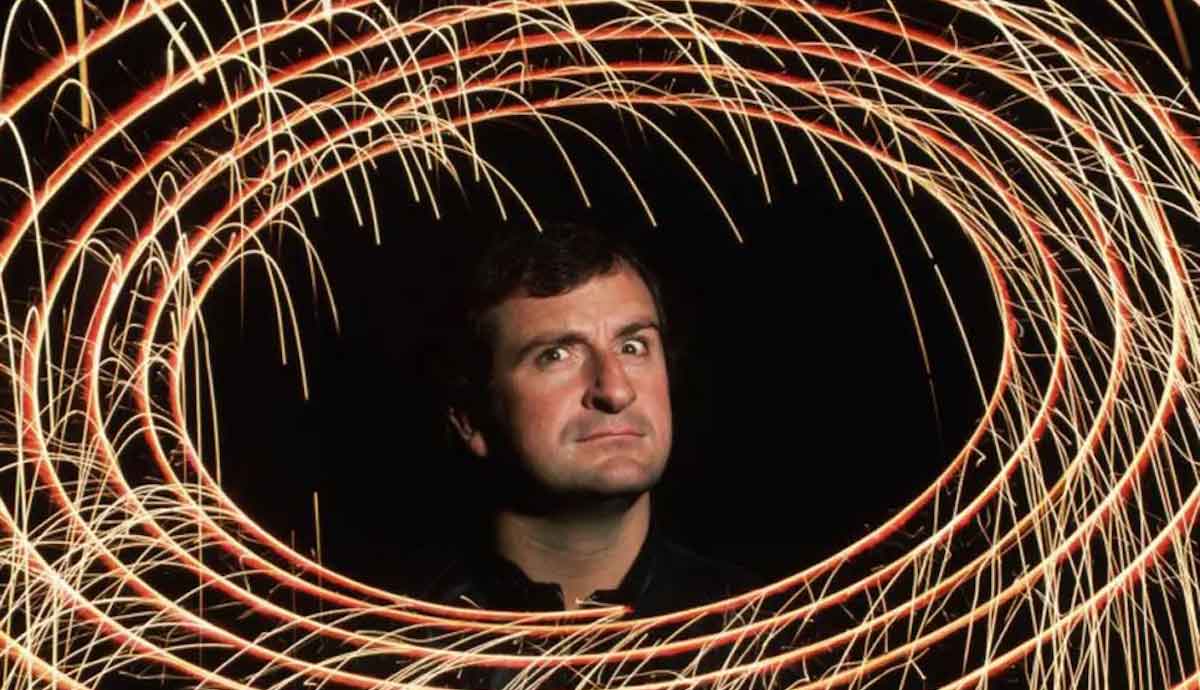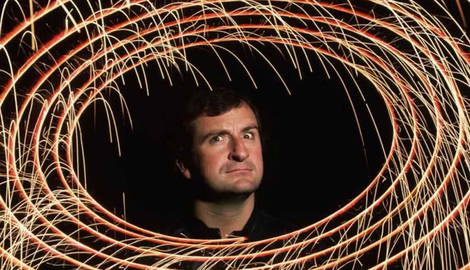
Douglas Adams was born in Cambridge, England, on March 11, 1952. Adams had an illustrious career that spanned over two decades until his untimely death in 2001, in Santa Barbara, California, at the age of 49. Adams studied English literature at St John’s College, Cambridge, but dropped out before completing his degree. He worked as a hospital porter, barn builder, and chicken shed cleaner, among other odd jobs, before becoming a writer.
Douglas Adams’ Literary Style

Adams began his writing career as a script editor and writer for various BBC radio and television programs, including Monty Python’s Flying Circus. In the late 1970s, he began working on a radio series called The Hitchhiker’s Guide to the Galaxy, which was later adapted into a series of novels, a television series, a comic book series, and a feature film. Adams’ literary style was defined by his wit, irreverence, and inventive use of elements of science fiction. He was renowned for his gift of turning the ordinary into something hilarious and for his proclivity for using science fiction to examine the follies of contemporary life. In the Hitchhiker’s Guide to the Galaxy series, for instance, Adams explores the oddities and eccentricities of the universe, including its different alien species, planets, and technologies, using a fictional guidebook.
Adams’ ability to blend sober scientific topics with humor and satire was one of his greatest contributions to science fiction. He frequently offered commentary in his writing on current events, including the place of technology in society, the perils of bureaucracy, and the pointlessness of war. He was also a strong supporter of environmental causes, and his art frequently demonstrated his concern for the planet’s future. Adams published a number of other books besides The Hitchhiker’s Guide to the Galaxy trilogy, such as Dirk Gently’s Holistic Detective Agency and The Long Dark Tea-Time of the Soul. In addition, he published non-fiction works like Last Chance to See, a travelog about critically endangered species.
The Hitchhiker’s Guide to the Galaxy

Adams was unique and ground-breaking in his usage of science fiction elements in The Hitchhiker’s Guide to the Galaxy. He experimented with traditional science fiction cliches to construct his own original, imaginative, and bizarre view of the cosmos. He did this, among other things, by bending the rules of physics and science to produce comedic scenarios.
For instance, the protagonist Arthur Dent is saved from Earth in the first book of the series just before the planet is obliterated by an alien race known as the Vogons. He is sent on board the Heart of Gold, a stolen spacecraft propelled by the Infinite Improbability Drive. By going through every point in the universe at once, this drive enables the ship to move through space in a way that defies basic physics. This results in unexpected and bizarre circumstances like when the ship finds itself in a totally improbable area and the crew runs into a group of sentient mattresses.
Adams also parodied modern themes like the place of technology in society by using elements of science fiction. The crew of the Heart of Gold visits a planet that is managed entirely by machines in the second novel called The Restaurant at the End of the Universe. The machines have advanced to the point where they have created their own religion, which honors the Great Prophet Zarquon. A world where people are essentially slaves to machines.

Marvin, the Paranoid Android is another illustration of how Adams uses science fiction for humor and satire. A highly intelligent robot named Marvin continually bemoans his life and experiences acute despair. Although being extremely advanced, his human partners frequently ignore and mistreat him. Adams’ portrayal of Marvin, which is both amusing and moving, is an illustration of how he can employ science fiction elements to address more profound philosophical ideas.
Alien life forms are a key component of the science fiction aspects of The Hitchhiker’s Guide to the Galaxy, which is why they are mentioned so frequently. Adams crafted a huge and diverse cosmos filled with a broad range of alien species, each with their own distinct traits, civilizations, and technologies. The Vogons, who are introduced in the first book’s opening scene, are among the most memorable alien species of the entire series.

The Vogons are a bureaucratic race of beings who are preoccupied with paperwork and poetry. They are primarily hated by other species in the cosmos because they were responsible for destroying Earth to create room for a hyperspace bypass. The Vogons’ fondness for paperwork and poetry is a lighthearted and sarcastic take on the uninteresting facets of contemporary life, such as meetings and paperwork. The colorful and sometimes crazy President of the Galaxy, Zaphod Beeblebrox, is another noteworthy extraterrestrial race in the series. Zaphod is well-known for his crazy actions and he frequently travels with Marvin, a melancholy robot who serves as his loyal sidekick. The concept of alien life forms is given a new twist by Zaphod’s two heads and the series’ humorous aspect is heightened by his flamboyant nature.
Douglas Adams’ singular viewpoint on the cosmos, his creative application of science fiction ideas, and his irreverent humor make The Hitchhiker’s Guide to the Galaxy a beloved classic that still inspires readers today. The ability of the series to entertain and engage readers at the same time sets it distinct from many other science fiction books. Adams was able to explore a wide range of science fiction issues, from the nature of existence to the function of technology in society, through his depiction of a large and diversified cosmos full of unique and memorable alien races. Adams did so with a lighthearted and amusing touch that made even the most difficult concepts understandable and interesting.
Dirk Gently’s Holistic Detective Agency

Dirk Gently’s Holistic Detective Agency is fundamentally a detective novel, yet it deviates from the formulaic rules of the genre. The narrative centers on quirky private investigator Dirk Gently, who tackles his investigations from a holistic worldview. Gently thinks that everything in the cosmos is connected and that the only way to solve a case is to comprehend the more powerful cosmic forces at work, as opposed to just pursuing clues and solving crimes.
As Gently navigates a succession of unusual and seemingly unrelated incidents to solve his cases, this method creates a story that is full of surprising twists and turns. However, Dirk Gently’s Holistic Detective Agency is more than just a detective narrative; it is also a work of science fiction, with time travel, teleportation, and other imaginative aspects that heighten the sense of mystery and wonder. There are numerous examples to support these assertions, one of which is a time-traveling sofa that is essential to the resolution of one particular case.

Its use of time travel is not your normal sci-fi trope, but rather a creative and original addition to the plot that enhances the sense of unpredictability and whimsy that is distinctive to Adams’ writing. Another example is the Electric Monk, a sentient device that is designed to believe things on behalf of its owner so that they don’t have to. This strange and fascinating invention is a testament to Adams’ ability to create quirky and memorable concepts.
The irreverent humor and distinctive point of view that Adams offers to the plot are what distinguishes Dirk Gently’s Holistic Detective Agency from other detective fiction works. His skill in fusing intricate concepts into a humorous and captivating story is clearly exhibited in this work. Adams examines topics including the nature of reality, the interdependence of all things, and the capacity of the human intellect. A recurring theme throughout the book is the interconnectedness of all things, which is illustrated by the way that disparate persons and events are linked together in unexpected ways.
This is especially clear in the manner in which Gently tackles his cases, as he frequently makes links between events or pieces of evidence that seem unrelated at first. Last but not least, the novel explores the power of the human mind in a variety of ways, through the psychic talents of some individuals or through Gently’s conviction in the value of intuition and intuition-based problem-solving. These themes give the narrative depth and complexity, elevating it above the level of straightforward detective fiction.
The Legacy of Douglas Adams

Despite their humorous tone, The Hitchhiker’s Guide to the Galaxy and Dirk Gently’s Holistic Detective Agency are works of enormous depth and complexity. Adams pushed readers to look beyond the surface level of the novel and to interact with underlying issues by using science fiction elements to examine deeper philosophical themes, such as the meaning of existence and the pursuit of knowledge. Adams’ literary style is truly distinctive. It combines aspects of science fiction, satire, and comedy to produce a work that defies categorization. His satirical approach to the genre, which frequently defied or twisted the laws of physics for comedic effect, marked a change from earlier, more serious, and conventional works of science fiction. In the end, Adams’ works serve as a testament to the ability of narrative to amuse the readers while still engaging them with more profound issues surrounding the society that we live in.










